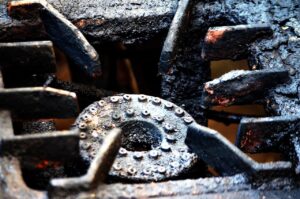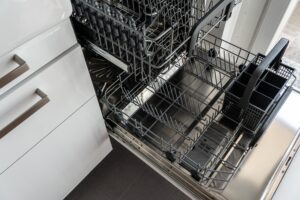DIY appliance repair refers to the practice of fixing household appliances yourself instead of hiring a professional. It involves identifying and troubleshooting common problems, and then implementing the necessary repairs. Learning how to repair appliances yourself can be a rewarding and cost-effective skill to have.
There are several benefits to learning how to repair appliances yourself. First and foremost, it can save you a significant amount of money. Hiring a professional repair technician can be expensive, especially when you factor in the cost of parts and labor. By doing the repairs yourself, you can avoid these costs and potentially save hundreds of dollars.
In addition to cost savings, DIY appliance repair also offers convenience. When an appliance breaks down, it can be frustrating to wait for a technician to come and fix it. By learning how to repair appliances yourself, you can address the issue immediately and get your appliance back up and running in no time.
Furthermore, DIY appliance repair empowers you to take control of your own home maintenance. Instead of relying on someone else to fix your appliances, you become self-sufficient and capable of handling repairs on your own. This sense of empowerment can boost your confidence and give you a sense of accomplishment.
Key Takeaways
- DIY appliance repair can save you money and time in the long run. – Basic tools and equipment are needed for DIY appliance repair. – Common appliance problems can be fixed with DIY methods. – Safety precautions should be taken when attempting DIY appliance repair. – Regular maintenance can prevent costly appliance repairs.
Benefits of DIY Appliance Repair
a) Cost savings: One of the biggest benefits of DIY appliance repair is the potential for significant cost savings. When you hire a professional repair technician, you not only pay for their expertise but also for the cost of parts and labor. By doing the repairs yourself, you can avoid these additional expenses and save a substantial amount of money.
b) Convenience: DIY appliance repair offers convenience in several ways. First, you don’t have to wait for a technician to come and fix your appliance. You can address the issue immediately and get your appliance back up and running in no time. Second, you don’t have to schedule appointments or take time off work to accommodate the technician’s schedule. You can work on the repairs at your own convenience.
c) Empowerment and self-sufficiency: Learning how to repair appliances yourself gives you a sense of empowerment and self-sufficiency. Instead of relying on someone else to fix your appliances, you become capable of handling repairs on your own. This can boost your confidence and give you a sense of accomplishment. Additionally, being able to fix your own appliances can make you more self-reliant and less dependent on others.
Tools and Equipment Needed for DIY Appliance Repair
a) Basic tools needed: To get started with DIY appliance repair, you’ll need a basic set of tools. This includes screwdrivers (both flathead and Phillips), pliers, an adjustable wrench, a multimeter, and a socket set. These tools will cover most common repairs and allow you to disassemble and reassemble appliances as needed.
b) Specialized equipment for specific repairs: In addition to basic tools, there may be specialized equipment required for specific repairs. For example, if you’re working on a refrigerator, you may need a condenser coil brush to clean the coils. If you’re working on a dryer, you may need a dryer vent cleaning kit to remove lint buildup. It’s important to research the specific repair you’re attempting and ensure you have the necessary equipment.
c) Safety gear: When working on appliances, it’s important to prioritize safety. This includes wearing appropriate safety gear such as gloves and safety glasses. Additionally, it’s important to ensure that the power source is turned off before beginning any repairs to avoid the risk of electric shock.
Common Appliance Problems and How to Fix Them
a) Refrigerator not cooling: One common problem with refrigerators is when they stop cooling properly. This can be caused by a variety of issues, including a faulty thermostat, a clogged condenser coil, or a malfunctioning compressor. To fix this problem, you can start by cleaning the condenser coil and checking the thermostat settings. If the issue persists, it may be necessary to replace the compressor or call a professional for assistance.
b) Washer not draining: If your washer is not draining properly, it could be due to a clogged drain hose or a faulty pump. To fix this problem, start by checking the drain hose for any obstructions. If it’s clear, you can then check the pump for any signs of damage or blockage. If necessary, you can replace the pump or call a professional for help.
c) Oven not heating: When an oven fails to heat up, it can be frustrating. This problem is often caused by a faulty heating element or a malfunctioning thermostat. To fix this issue, you can start by checking the heating element for any signs of damage or wear. If it’s damaged, you can replace it yourself. If the heating element is fine, you may need to replace the thermostat or seek professional assistance.
d) Dishwasher not cleaning dishes: If your dishwasher is not cleaning dishes properly, it could be due to a clogged spray arm or a malfunctioning pump motor. To fix this problem, start by cleaning the spray arm and checking for any blockages. If that doesn’t solve the issue, you can check the pump motor for any signs of damage or wear. If necessary, you can replace the pump motor or call a professional for help.
e) Dryer not drying clothes: When a dryer fails to dry clothes effectively, it can be frustrating and time-consuming. This problem is often caused by a clogged vent or a faulty heating element. To fix this issue, start by checking the vent for any blockages and cleaning it out if necessary. If that doesn’t solve the problem, you can check the heating element for any signs of damage or wear. If needed, you can replace the heating element or seek professional assistance.
Tips for Safe and Effective Appliance Repair
a) Safety precautions to take: When working on appliances, it’s important to prioritize safety. This includes wearing appropriate safety gear such as gloves and safety glasses. Additionally, it’s important to ensure that the power source is turned off before beginning any repairs to avoid the risk of electric shock. It’s also a good idea to unplug the appliance or turn off the circuit breaker to further ensure your safety.
b) Proper handling of tools and equipment: When using tools and equipment for appliance repair, it’s important to handle them properly. This includes using tools for their intended purpose and not forcing them if they’re not working properly. It’s also important to keep tools in good condition by cleaning and maintaining them regularly.
c) Importance of turning off power sources: Before starting any appliance repair, it’s crucial to turn off the power source. This can be done by unplugging the appliance or turning off the circuit breaker. Failure to do so can result in electric shock or other serious injuries. Always double-check that the power is off before beginning any repairs.
Cost Comparison: DIY vs. Professional Appliance Repair
a) Comparison of costs for DIY repair vs. hiring a professional: When comparing the costs of DIY appliance repair versus hiring a professional, there are several factors to consider. DIY repair typically involves only the cost of parts and any specialized equipment needed. Hiring a professional, on the other hand, involves the cost of parts, labor, and potentially a service fee. In general, DIY repair tends to be more cost-effective, especially for simple repairs.
b) Factors to consider when deciding which option to choose: When deciding whether to attempt a DIY repair or hire a professional, there are several factors to consider. First and foremost, consider your skill level and comfort with appliance repair. If you’re not confident in your abilities, it may be best to hire a professional. Additionally, consider the complexity of the repair and the potential risks involved. If the repair is complex or poses a safety risk, it’s best to leave it to the professionals.
How to Avoid Costly Appliance Repairs
a) Regular maintenance tips to prevent breakdowns: One of the best ways to avoid costly appliance repairs is by performing regular maintenance. This includes cleaning and inspecting appliances regularly, as well as following manufacturer guidelines for usage and care. For example, regularly cleaning the lint trap in your dryer can prevent lint buildup and reduce the risk of a fire.
b) Proper usage and care of appliances: Another way to avoid costly repairs is by using and caring for your appliances properly. This includes not overloading them, using them according to their intended purpose, and avoiding excessive wear and tear. For example, overloading a washing machine can put strain on the motor and cause it to fail prematurely.
c) Signs to look out for that indicate a potential problem: It’s important to be aware of signs that indicate a potential problem with your appliances. These signs can include strange noises, unusual smells, or a decrease in performance. By addressing these issues early on, you can prevent them from turning into more serious and costly repairs.
DIY Appliance Maintenance: Simple Steps to Keep Your Appliances Running Smoothly
a) Cleaning and upkeep tips for each appliance: Each appliance requires specific cleaning and upkeep to keep it running smoothly. For example, refrigerators should have their condenser coils cleaned regularly to prevent dust buildup. Washing machines should have their detergent dispensers cleaned to prevent clogs. It’s important to research the specific maintenance requirements for each appliance you own.
b) How often to perform maintenance tasks: The frequency of maintenance tasks will vary depending on the appliance and its usage. However, there are some general guidelines to follow. For example, refrigerators should have their condenser coils cleaned every six months, while washing machines should have their hoses checked for leaks annually. It’s important to consult the manufacturer’s guidelines for specific recommendations.
Troubleshooting Guide for Common Appliance Issues
a) Step-by-step guide for diagnosing and fixing common problems: When faced with a common appliance problem, it can be helpful to have a step-by-step guide for troubleshooting and fixing the issue. This can involve identifying the problem, researching potential causes, and implementing the necessary repairs. There are many online resources and tutorials available that can guide you through the process.
b) When to call a professional for help: While DIY appliance repair can be cost-effective and empowering, there are times when it’s best to call a professional for help. This includes situations where the repair is complex, involves specialized equipment, or poses a safety risk. Additionally, if you’re not confident in your abilities or if the repair is covered under warranty, it may be best to seek professional assistance.
Saving Money and Time with Appliance DIY
In conclusion, learning how to repair appliances yourself can be a rewarding and cost-effective skill to have. DIY appliance repair offers several benefits, including cost savings, convenience, and empowerment. By investing in the necessary tools and equipment, familiarizing yourself with common appliance problems, and following safety precautions, you can successfully repair many common issues yourself.
While there are times when it’s best to call a professional for help, DIY appliance repair can save you both time and money in many cases. By performing regular maintenance and taking proper care of your appliances, you can also prevent costly breakdowns and extend their lifespan. So why not give DIY appliance repair a try? With the right knowledge and tools, you can become a self-sufficient homeowner who is capable of handling their own appliance repairs.
Can I Save Money by Fixing My Appliance Issue Myself?
If you’re considering evaluating severity of appliance issue yourself, think about the risks. While DIY fixes may save money initially, incorrect repairs can lead to more costly issues down the line, and safety hazards. It’s often best to consult a professional to ensure the problem is fixed correctly. In addition, professionals can often provide budget appliance repair solutions that you may not be aware of, helping to keep costs manageable. By leveraging their expertise, you can make informed decisions that not only resolve the immediate issue but also extend the life of your appliances. Ultimately, investing in a qualified technician can save you time, effort, and money in the long run.
FAQs
What is Appliance DIY?
Appliance DIY refers to do-it-yourself repairs and maintenance of household appliances such as refrigerators, washing machines, and dishwashers.
What are the benefits of Appliance DIY?
Appliance DIY can save you money on repair and maintenance costs, as well as give you a sense of accomplishment and independence. It can also help you extend the lifespan of your appliances.
What are some common Appliance DIY repairs?
Common Appliance DIY repairs include replacing a broken door seal, unclogging a dishwasher drain, and replacing a faulty thermostat.
What tools do I need for Appliance DIY?
The tools you need for Appliance DIY will depend on the specific repair or maintenance task. However, some common tools include screwdrivers, pliers, wrenches, and a multimeter.
Are there any risks associated with Appliance DIY?
Yes, there are risks associated with Appliance DIY, including electrical shock, burns, and injury from moving parts. It is important to take proper safety precautions and to know your limits when attempting Appliance DIY.
When should I call a professional for Appliance repair?
You should call a professional for Appliance repair if you are unsure of how to safely complete the repair, if the repair requires specialized tools or knowledge, or if the repair is covered under warranty.



